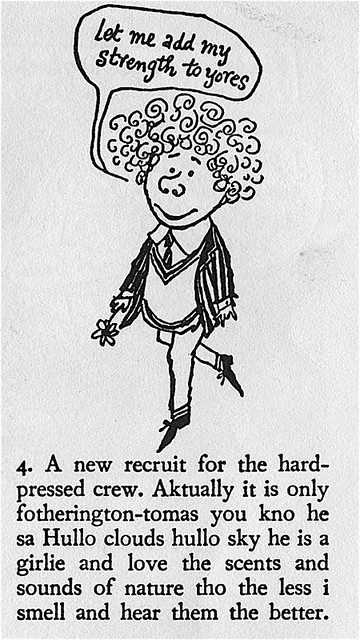People’s diets are changing. Not enough, but a fair bit: people are increasingly cutting down on meat (or decreasingly cutting up meat) and that’s grrrrrrrrreat. But I’ve still got a bone to pick. (Hah!)
Something that’s happened in my life more times than I can count is that someone explains to me that they’re eating less meat, not because they care about animals, but because of the environment. (I say ‘more times than I can count’, but now I come to think of it, I remember every fucker who’s ever said this to me, and the look on their face when they said it.) And I always want to respond, Why? Why don’t you care about animals? Is it because you’re a knob? (I’m a great laugh to go to the pub with, and have loads of friends too.)
There is a conviction deep-rooted in our culture that humans and animals are fundamentally different, and that whatever the genetic and behavioural similarity between us, we can’t ascribe to them feelings that we would recognise in ourselves. This is considered the intelligent and objective viewpoint, despite the fact that it has all the logical credibility of maintaining that, when your eyes are shut, you can make everything stop existing.
 |
| "where's your hat mate?" |
I read an excellent review by Francis Gooding of this book by Frans de Waal, which points out the similarity of emotional behaviours between humans and other animals. A favourite extract (from Gooding, quoting de Waal):
"Apes often greet each other by 'placing their lips gently on each other's mouth or shoulder and hence kiss in a way and under circumstances that greatly resembles human kissing'". For de Waal, 'Dubbing an ape's kiss 'mouth to mouth contact' so as to avoid anthropomorphism deliberately obfuscates the meaning of the behaviour'.
To acknowledge this gesture of affection for what it is - something we have all experienced (except for you, Billy No-Mates) - risks being held as a dewy-eyed projection of sentiment. A stupid fallacy: believing that experiences are defined by the fact that they occur in us, so a priori refusing to accept that they can be real in other species.
In Gooding’s words, our understanding of ethology has been skewed by studies which "set out to prove the scientists’ preconceptions instead of basing [their] conclusions on close observation". This striving towards ignorance has a clear agenda: to justify our treatment of animals, as if their consciousness is of no value. To excuse the most miserable cruelty because their pain isn’t the same as our pain, just like their love isn’t the same as our love. That’s why it’s ok to rip a calf from its mother and slaughter it, or keep it for a short life in a metal box. That’s why it’s ok to eat whatever you want, because it tastes good to you.
This paper that I read (heroic of me to read something so boring - I did it for you) is a nifty example of that kind of bad science. It makes the point that core ‘emotion states’ are a shared evolutionary feature, not just among mammals, and that these shared states manifest in various ‘characteristic species-type behaviours’. The authors base their claim on neuroscience, evolutionary theory, and observation.
 |
| Illustration of emotions as expressed across species (upon seeing your mum), as found in Darwin's The Expression of the Emotions in Man and Animals |
So far so good. The authors then argue that two things follow on from emotion states: behaviour and ‘feelings’: the subjective and conscious experience of emotion. We have no certain way to understand the latter in other animals, so according to the authors, their distinction between emotion states and feelings ‘frees us of the need to identify human-like feelings (or indeed any feelings) in other animals’. What they don’t explain, but merely take as read, is why it is necessary to be ‘free’ of this need. Is it rational to assume that a shared trait suddenly fractures into total ontological difference, existence vs nonexistence, between us and every other species of animal, based on nothing but the fact that we understand ourselves, as if there could be nothing else to understand?
Talkin bout species? Talkin bout specious anthropocentric arguments, am I right?!!!
One reason for wanting this distinction is unpleasantly suggested in the phrasing of the final sentence in the article, which compares scientists that research the ‘elusive property’ of emotion ‘in humans and those working on less complex but more experimentally tractable model systems’. My italics.

So at the risk of coming across a bit hello-clouds-hello-sky, what I want to say is that animals are incredible and complicated and sensitive and amazing, and often in ways that are directly relatable to the way we are. Features that scientists have historically claimed are unique to humans (tool use; self-awareness; empathetic perspective taking; episodic memory - that is, awareness of time; ability to use language) are time and again proved to be shared by different species, and not only mammals: crows, for example, have evolved a capacity for individual inventiveness, just like the apes that we are, because they faced the same challenges to survival. The real foundation of our ‘objective’ structure of ontological isolationism is nothing but ignorance, an ignorance that many of us gain from preserving.
There is an unknowable aspect to other animals, much as there is to Tories, but this shouldn’t be a reason to set limits on the spectrum of our empathy. What we do know (and, if we look, can often see quite clearly) is much greater than what we don’t know. They have emotions, they experience suffering and its obverse. I can’t see any excuse for overlooking this. It should be no more acceptable to say ‘I don’t care about animals’ than it is to say ‘I don’t care about humans’.